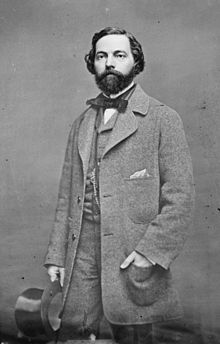 |
| Porcher Miles |
Member of Congress, Richmond, Va.:
MY DEAR COLONEL: Can you not persuade the Government to take advantage of the present favorable condition of affairs for issuing an address, powerfully written, to the Northwestern States, calling upon them to cast aside the despotic, destructive, and contemptible Lincoln Government; to form a separate Confederacy of the Northwestern States, to include Ohio, with its capital at Saint Louis; then to enter into an alliance, offensive and defensive, with the Southern Confederacy, so as to have a perpetual free use of that common artery, the Mississippi River, for which the Northwestern States contend they are mainly fighting. It seems to me that our evident community of interests, our natural opposition to high tariff and to protective duties in favor of fisheries, a large navy, and commercial marine, &c., ought to cement an eternal alliance between us, if they will only let the negro question alone. I should regret not to have time to write more on this important subject, were I not convinced you will anticipate all I could say about it. Be expeditious, however, for circumstances may vastly change our prospects a few weeks hence. Now, I believe, is the most propitious moment to attempt to divide our enemies and bring about a welcome and honorable peace without further expenditure of blood and treasure. As to the Northeastern States and others of the present Union, they will be left out in the cold to quarrel amongst themselves or form an alliance with the Canadians for better or for worse. Of course I desire that all the present slave States shall join our Southern Confederacy. I am as happy to hear of our late successes in Virginia, Tennessee, and Mississippi as tough I had taken a part in them. Lee and Bragg have done remarkably well, especially the former, whose battle of Fredericksburg would do honor to any general of any of any country. May they continue to meet with such successes is my most sincere wish. Our preparations are still progressing, but more heavy guns are much needed here and at Savannah. General Whiting has called upon me for assistance to repel the threatened attack on Wilmington, but I could only send him Gist with one brigade and three batteries, for all my available forces in South Carolina, Georgia, and Florida do not amount to more than my forces at the battle of Manassas. You remember, I suppose, what they were. It takes, moreover, ninety hours for 1,000 men to send any large force to and return from Wilmington; hence it would be endangering Charleston and Savannah to send him more troops from my department, especially when the threatened attack on Wilmington may be merely a feint to attack Charleston or Savannah, as meditated and proclaimed long ago. Weldon or Goldsborough, in my opinion, is more important to the enemy than Wilmington.
Yours, very truly,
G. T. BEAUREGARD.
Series I., Vol. 53, Page 270.
Miles was a "fire eater", one of the secessionists who lead the South to war. An attorney from Charleston before the war, he served in the Confederate Congress. He was an aquaintance of Beauregard (as Beauregard was in command in Charleston). Here is being asked to persuade the Confederate leadership to make overtures to the Northwestern states to form their own confederacy and establish relations with the South. Beauregard notes, correctly, one of the little known reasons for the war. The states in what was then the western United States fought in no small measure to preserve government control of the Mississippi River all the way to the gulf. It is unlikely Beauregard's idea would of had success, but it was probably worth an overture.
No comments:
Post a Comment